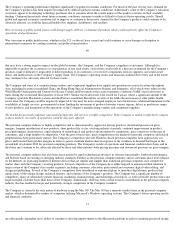Apple 2003 Annual Report Download - page 41
Download and view the complete annual report
Please find page 41 of the 2003 Apple annual report below. You can navigate through the pages in the report by either clicking on the pages listed below, or by using the keyword search tool below to find specific information within the annual report.
operating results.
Information technology system failures and breaches of data security could disrupt the Company's ability to function in the normal course of
business by potentially causing delays or cancellation of customer orders, impeding the manufacture or shipment of products, or resulting in the
unintentional disclosure of customer or Company information. Management has taken steps to address these concerns by its implementation of
sophisticated network security and internal control measures. However, there can be no assurance that a system failure or data security breach
will not have a material adverse effect on the Company's results of operations.
The Company is exposed to credit risk on its accounts receivables. This risk is heightened as economic conditions worsen.
The Company distributes its products through third-party computer resellers and retailers and directly to certain educational institutions and
commercial customers. A substantial majority of the Company's outstanding trade receivables are not covered by collateral or credit insurance.
The Company also has non-trade receivables from certain of its manufacturing vendors resulting from the sale by the Company of raw material
components to these manufacturing vendors who manufacture sub-
assemblies or assemble final products for the Company. While the Company
has procedures in place to monitor and limit exposure to credit risk on its trade and non-trade receivables, there can be no assurance that such
procedures will be effective in limiting its credit risk and avoiding losses. Additionally, if the global economy and regional economies fail to
improve or continue to deteriorate, it becomes more likely that the Company will incur a material loss or losses as a result of the weakening
financial condition of one or more of its customers or manufacturing vendors.
The Company is subject to risks associated with environmental regulations.
Production and marketing of products in certain states and countries may subject the Company to environmental and other regulations
including, in some instances, the requirement to provide customers the ability to return product at the end of its useful life, and place
responsibility for environmentally safe disposal or recycling with the Company. Such laws and regulations have recently been passed in several
jurisdictions in which the Company operates, including various European Union member countries, Japan and California. Although the
Company does not anticipate any material adverse effects in the future based on the nature of its operations and the thrust of such laws, there is
no assurance that such existing laws or future laws will not have a material adverse effect on the Company's results of operation and financial
position.
Changes in accounting rules could adversely affect the Company's future operating results.
Financial statements are prepared in accordance with U.S. generally accepted accounting principles. These principles are subject to
interpretation by various governing bodies, including the FASB and the SEC, who interpret and create appropriate accounting regulations. A
change from current accounting regulations can have a significant effect on the Company's results of operations and could impact the manner in
which the Company conducts business.
Unanticipated changes in the Company's tax rates could affect its future results.
The Company's future effective tax rates could be favorably or unfavorably affected by unanticipated changes in the mix of earnings in
countries with differing statutory tax rates, changes in the valuation of the Company's deferred tax assets and liabilities, or by changes in tax
laws or their interpretation. In addition, the Company is subject to the continuous examination of our income tax returns by the Internal
Revenue Service and other tax authorities. The Company regularly assesses the likelihood of adverse outcomes
50
resulting from these examinations to determine the adequacy of our provision for income taxes. There can be no assurance that the outcomes
from these continuous examinations will not have an adverse effect on its operating results and financial condition.
The Company's stock price may be volatile.
The Company's stock has at times experienced substantial price volatility as a result of variations between its actual and anticipated financial
results and as a result of announcements by the Company and its competitors. In addition, the stock market has experienced extreme price and
volume fluctuations that have affected the market price of many technology companies in ways that have been unrelated to the operating
performance of these companies. These factors, including lack of positive performance in the Company's stock price, as well as general
economic and political conditions and investors' concerns regarding the credibility of corporate financial reporting and integrity of financial
markets, may materially adversely affect the market price of the Company's stock in the future.
The Company's acquisition activity could disrupt its ongoing business and may present risks not contemplated at the time of the transaction.
The Company has acquired and may continue to acquire companies that have products, services, personnel and technologies that complement
the Company's strategic direction and product roadmap. These acquisitions may involve significant risks and uncertainties, including
























